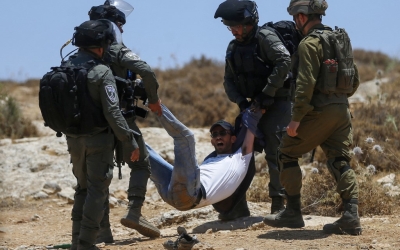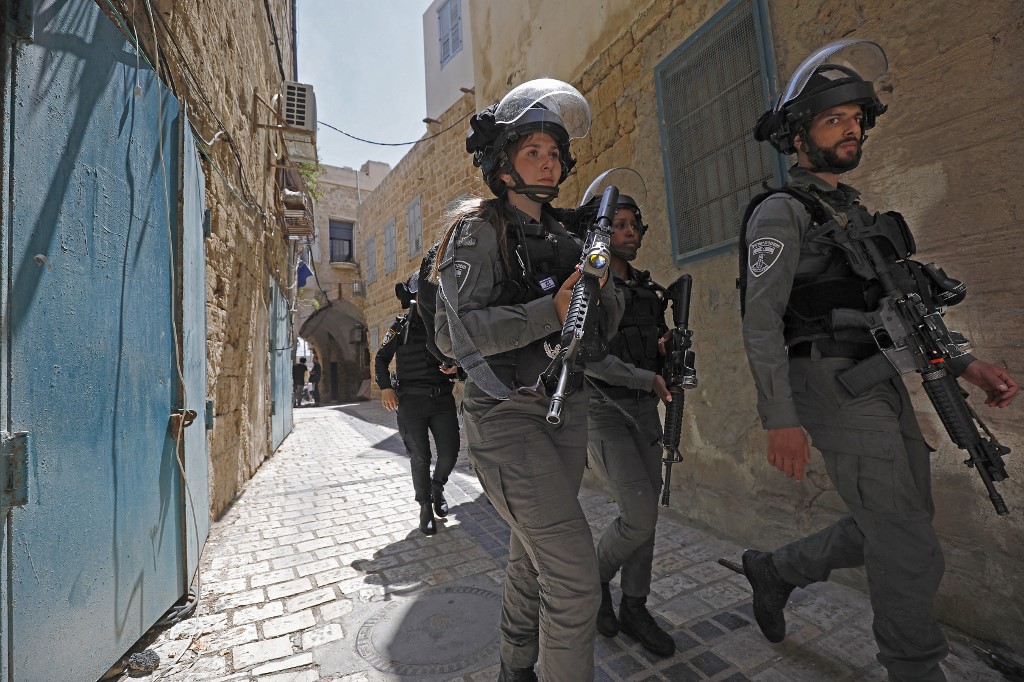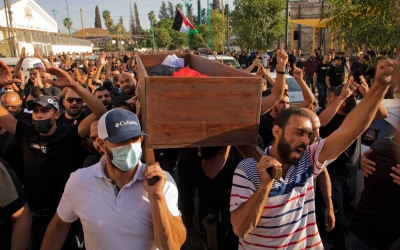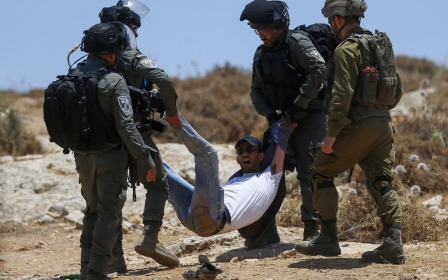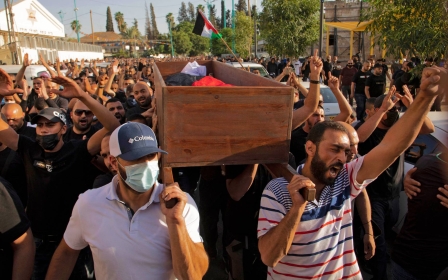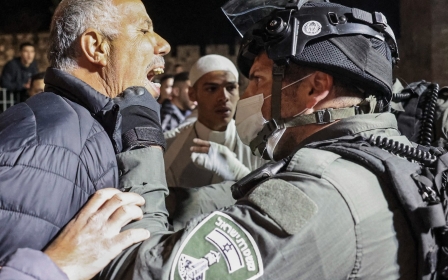How Israel waged judicial war against Palestinian citizens after the May 2021 uprising
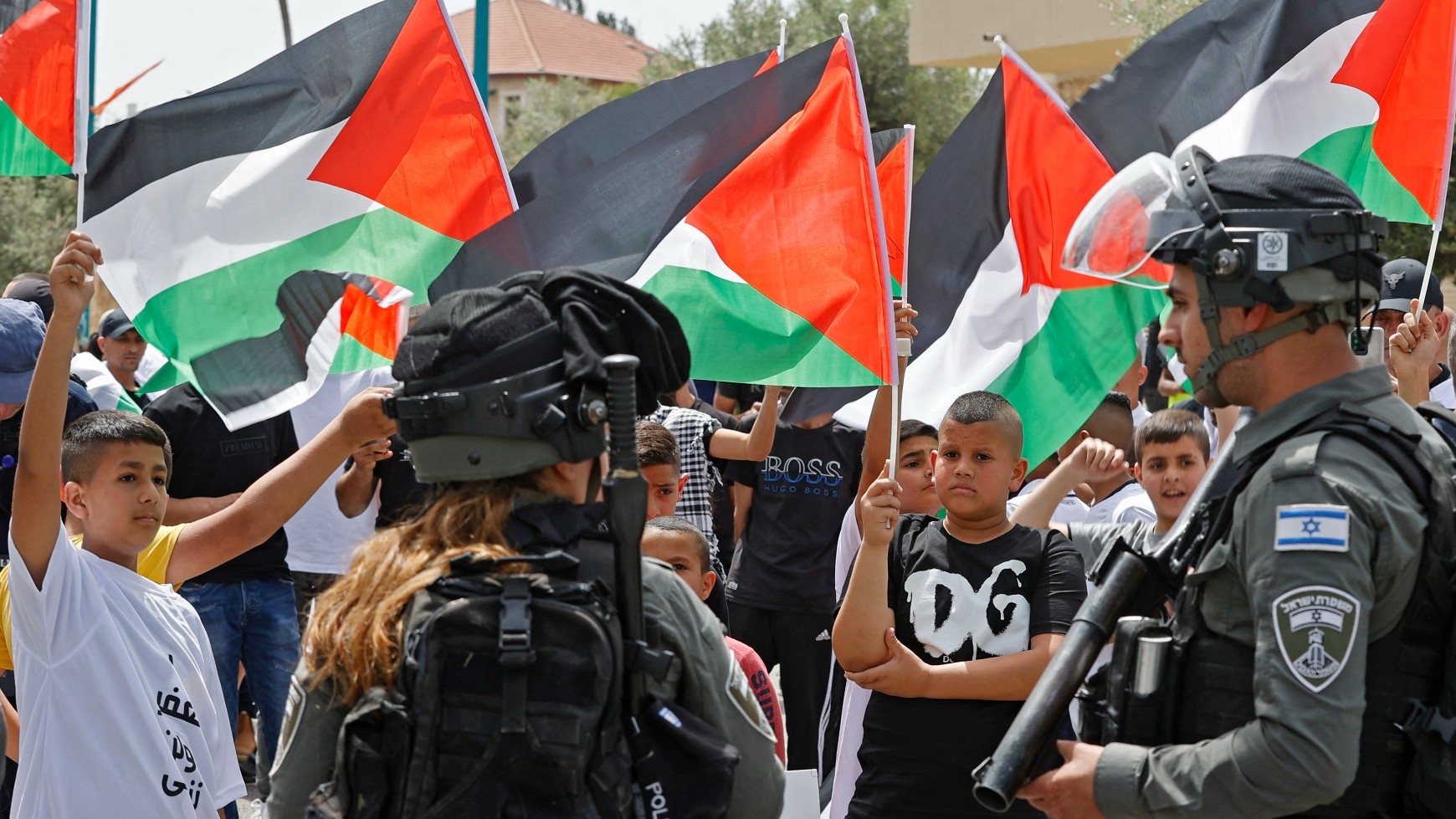
On 24 May 2021, Israel launched a mass arrest campaign to deter the uprising of Palestinians within the so-called Green Line under the banner of "Law and Order".
Most judges ignore police abuse, assaults on detainees, physical violence, children's rights, and even constitutional arguments about citizens' right to protest
The police announced that within 48 hours 500 people would be arrested. By 10 June, Israel had arrested more than 2,150 people, 91 percent of whom were Palestinian citizens of Israel. Police forces, special units, border guards and secret police stormed the predominantly Arab towns cracking down on Palestinian protesters.
They intentionally targeted minors in violent and arbitrary arrests, and subjected them to prolonged detention and interrogation by Shin Bet agents.
In the face of these mass arrests, hundreds of Palestinian lawyers residing within the 1948 occupied territories organised and volunteered alongside human rights groups and popular committees in a coordinated effort to defend detainees, provide them with legal assistance inside police stations, and monitor the flagrant human rights violations by Israeli security forces.
I was a part of one of these groups, “Women Human Rights Defenders of Detainees”. It wasn't long before crowdfunding campaigns were organised to support the detainees and their families in covering their legal expenses.
Flagrant rights violations
Some of the Israeli violations we uncovered included: violent dispersal of protests and arbitrary arrests; confiscation of personal cellular phones; assaulting journalists and activists who were filming and documenting attacks; kidnapping of children by special forces of undercover teams; using excessive force during arrests and transfers to detention centres; inhumane prison conditions; and postponing urgent medical treatment for detainees until taking their statements.
Many rights violations of detainees - particularly children - have taken place in police stations: the use of horrific physical violence, threats and psychological violence; denying them basic rights such as legal advice before interrogation; refusing to conduct interrogations in Arabic; denying a parent or guardian the right to be present during the interrogation of their children; and interrogating many of them during very late hours, in violation of the law.
The police further attempt in various ways to thwart the work of defence teams. In many cases, the police block the detention centre's entrance to prevent attorneys from learning the name and number of detainees.
Other tactics include denying lawyers pertinent information regarding their clients and preventing them from advising them.
In a Nazareth police station, Israeli officers notoriously ran a "torture room", where arrested Palestinians, from protesters to bystanders and even attorneys, were subjected to physical, verbal, and psychological abuse. In Umm al-Fahm, the police station completely closed and stopped answering phone calls after lawyers insisted on invoking the rights of detainees, especially those needing medical treatment.
Israeli police have often taken punitive steps aimed at exhausting attorneys, such as delaying interrogations until the early morning hours, or making them wait long hours before meeting their clients, as my colleagues and I experienced at a police station in Haifa.
Often, the release of Palestinian detainees was conditioned on them stipulating that they would not participate in any future demonstrations. Many would be held under house arrest for long periods, while others would be deported from their areas of residence or place of study. University students were among the deportees.
Most judges ignore police abuse, assaults on detainees, the horrific effects of physical violence, children's rights, and even constitutional arguments about citizens' right to protest.
Targeting children
It was apparent that Israeli prosecutors had intentionally escalated their targeting of Palestinian children by aggressively filing appeals against their release and deliberately keeping them in detention despite their age and circumstances.
The 2021 Palestinian uprising was met with a policy of punishment. This policy was announced by the state attorney's office in its statements and periodic reports, and was reiterated again in its report on Israel's “Guardian of the Walls” operation, summarising the state's effort to crack down on mass protests against Israel's assault on Gaza in May 2021.
In some cases, the public prosecution successfully appealed, considering the sentence too lenient and demanding a harsher punishment which the judge then granted.
Since April 21, Israel's state attorney's office has filed 397 indictments against 616 defendants, 545 of whom are Arabs, including 161 children. In other words, the percentage of Arabs reached 88.5, with children making up 26 percent - a very high number that falls under collective punishment.
A "unified opening preamble" was prepared for all indictments against Palestinian defendants. The prosecution wanted to give a general character to all charges collectively and preemptively. It also set up a special command headquarters with the aim of unifying the punitive policy, which the public prosecution saw as being "on a national mission". And in all files it demanded arrest until the end of the procedures, which lasted for many months until the verdict was decided.
The public prosecution adopted a stringent policy and criteria by refusing to release detainees and targeting children; instead of looking for alternatives to imprisonment, it put them on trial as adults and kept them in detention. Its policy was reflected in the filing of serious indictments and the adoption of the provisions of "terrorist acts", "racist background" and "hate crimes", which double the sentences for the same charge.
Of the 397 indictments, 239 were considered "aggravated" - 85 percent of them filed against Arabs and 20 percent filed against children - demanding actual imprisonment for years. Terrorism charges were filed against 94 defendants, 90 percent of whom are Arabs; 95 defendants were charged with terrorism based on racist motivations, 87 percent of whom were Arabs.
Charges based on "racist grounds" were filed against 50 defendants, 70 percent of whom are Arabs. We need no further analysis on the discriminatory policies in filing indictments prior to carrying out arrests.
So far, verdicts have been issued in 80 cases, all of which carried prison sentences. In some cases, the public prosecution successfully appealed, considering the sentence too lenient and demanding a harsher punishment which the judge then granted.
In effect, the prosecution categorises Palestinian Arab citizens as enemies, and wrote in its report: "The Arabs carried out acts of sabotage and violence against Jews and their properties in return for a very small number of attacks by Jewish citizens against Arabs."
This is a flip of the truth, as all the attacks on residential neighbourhoods were carried out by Jewish groups against Arab neighbourhoods.
State Comptroller's report
A report released by the State Comptroller on 27 June 2022 confirms that the mixed cities are a part of the Israeli public scene, and that what is happening in them reflects the complexities of Israeli society.
The report addresses the May 2021 uprising and describes it as the events that occurred in some of these mixed cities, including Haifa, Acre, Lydda, and Jaffa.
It says that these incidents, during which three Israeli citizens (two of them Palestinian citizens of Israel) were killed, brought to the surface existing tensions between the different population groups, and stressed the need to take steps at the public and local levels. It also stressed the importance of examining how the law is enforced in these cities.
The report deals with “the flaw in the police’s performance” at all stages, preparatory and during the confrontation with the incidents, and stresses that the incidents also showed weakness and imbalance in sharing roles and responsibilities between the police and the Shin Bet, due to the police’s unpreparedness to deal with the incidents.
In other words, it considers the collective punishment of Palestinian citizens of Israel during these incidents as insufficient, and demands more repressive measures against them by the police and harsher prison sentences by the courts.
The report believes that the solution is through municipal budgets. It's as if the remedy to the historical injustice and the consequences of the Palestinian catastrophe, or Nakba, as well as racist discriminatory laws against them, is to increase budgets for Palestinians in these historic Palestinian cities.
More than one year after Israel's mass arrest campaign, it is clear that the state is bent on escalation, rendering Palestinian citizens of Israel an endangered demographic.
It was, therefore, no surprise, recently, that while Israel was once again attacking Gaza, its policemen and border guards, who had doubled in number, along with violent right-wing gangs, were ready to wage a campaign of repression against Palestinian protesters.
The views expressed in this article belong to the author and do not necessarily reflect the editorial policy of Middle East Eye.
This article is available in French on Middle East Eye French edition.
Middle East Eye propose une couverture et une analyse indépendantes et incomparables du Moyen-Orient, de l’Afrique du Nord et d’autres régions du monde. Pour en savoir plus sur la reprise de ce contenu et les frais qui s’appliquent, veuillez remplir ce formulaire [en anglais]. Pour en savoir plus sur MEE, cliquez ici [en anglais].



